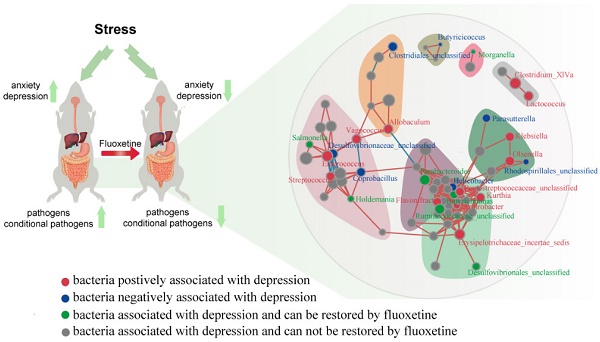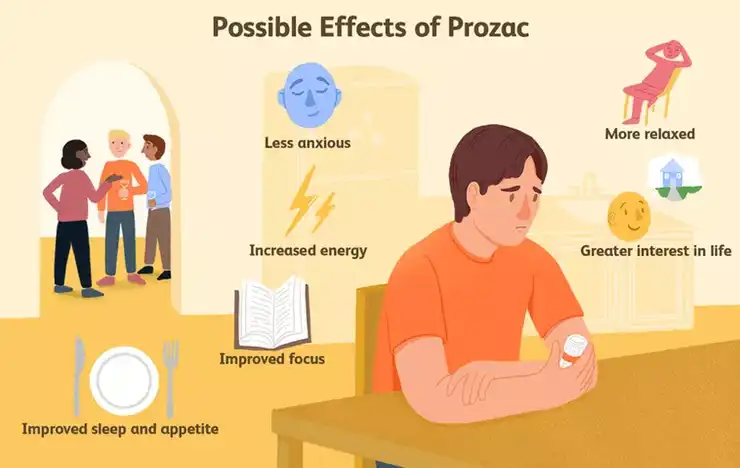Fluoxetine powder is a widely prescribed antidepressant medication that belongs to the class of selective serotonin reuptake inhibitors (SSRIs). It is primarily used to treat various mental health conditions by increasing the levels of serotonin, a neurotransmitter that plays a crucial role in regulating mood, in the brain. Fluoxetine powder has been approved by the FDA for treating several psychiatric disorders and has shown effectiveness in managing a range of symptoms associated with these conditions.
How does fluoxetine powder work for depression?
Depression is one of the most common mental health disorders worldwide, affecting millions of people. Fluoxetine powder has been extensively studied and proven effective in treating major depressive disorder (MDD). The medication works by inhibiting the reuptake of serotonin in the brain, allowing more of this neurotransmitter to remain available for use by brain cells. This increase in serotonin levels helps to improve mood, reduce feelings of sadness and hopelessness, and restore interest in daily activities.

When prescribed for depression, fluoxetine powder is typically taken once daily, with or without food. The dosage may vary depending on the severity of the condition and the individual's response to treatment. It's important to note that the full therapeutic effects of fluoxetine may take several weeks to become apparent, as the brain needs time to adjust to the increased serotonin levels.
Studies have shown that fluoxetine powder is effective in treating various forms of depression, including:
- Major depressive disorder (MDD)
- Dysthymia (persistent depressive disorder)
- Seasonal affective disorder (SAD)
- Postpartum depression
In addition to its antidepressant effects, fluoxetine powder has also been found to help improve energy levels, sleep quality, and overall cognitive function in individuals with depression. This comprehensive approach to symptom management makes it a valuable treatment option for many patients struggling with depressive disorders.
Can fluoxetine powder be used to treat anxiety disorders?
Yes, fluoxetine powder has been proven effective in treating various anxiety disorders. While it was initially developed as an antidepressant, research has shown that fluoxetine can also help alleviate symptoms associated with several types of anxiety. The medication's ability to regulate serotonin levels in the brain not only impacts mood but also helps to reduce feelings of fear, worry, and panic that are characteristic of anxiety disorders.

Some of the anxiety disorders that can be treated with fluoxetine powder include:
- Generalized anxiety disorder (GAD)
- Panic disorder
- Social anxiety disorder (SAD)
- Obsessive-compulsive disorder (OCD)
- Post-traumatic stress disorder (PTSD)
For individuals with anxiety disorders, fluoxetine powder can help reduce the frequency and intensity of anxiety symptoms, such as excessive worrying, restlessness, and physical manifestations like rapid heartbeat or sweating. It can also help improve overall quality of life by allowing patients to engage more fully in daily activities and social interactions that may have been previously limited by their anxiety.
When prescribed for anxiety disorders, the dosage and duration of treatment may differ from those used for depression. It's essential for patients to work closely with their healthcare providers to determine the most appropriate treatment plan and to monitor progress over time. As with depression treatment, it may take several weeks for the full effects of fluoxetine to become apparent in anxiety disorders.
What other conditions can fluoxetine powder treat?
Beyond depression and anxiety disorders, fluoxetine powder has been found to be effective in treating a variety of other mental health and neurological conditions. Its versatility as a medication has led to its use in managing symptoms associated with several disorders that may not initially seem related to serotonin regulation.
Some additional conditions that fluoxetine powder can treat include:
- Bulimia nervosa: Fluoxetine has been approved by the FDA for the treatment of bulimia nervosa, an eating disorder characterized by binge eating followed by purging behaviors. The medication can help reduce binge-eating episodes and purging behaviors, as well as address underlying depression and anxiety that often accompany eating disorders.
- Premenstrual dysphoric disorder (PMDD): This severe form of premenstrual syndrome can be effectively managed with fluoxetine powder. The medication helps alleviate mood swings, irritability, and physical symptoms associated with PMDD.
- Bipolar disorder: While fluoxetine is not typically used as a first-line treatment for bipolar disorder, it may be prescribed in combination with mood stabilizers to help manage depressive episodes in some patients with bipolar II disorder.
- Fibromyalgia: Some studies have shown that fluoxetine can help reduce pain and improve overall functioning in individuals with fibromyalgia, a chronic condition characterized by widespread muscle pain and fatigue.
- Selective mutism: This anxiety disorder, which primarily affects children and is characterized by an inability to speak in certain social situations, has shown improvement with fluoxetine treatment in some cases.
It's important to note that while fluoxetine powder has shown effectiveness in treating these conditions, its use for some of these disorders may be off-label, meaning it has not been specifically approved by regulatory agencies for these purposes. As with any medication, the use of fluoxetine for these conditions should be carefully considered and monitored by a healthcare professional.
In conclusion, fluoxetine powder is a versatile medication that has proven effective in treating a wide range of mental health and neurological conditions. Its primary use in managing depression and anxiety disorders has been well-established, but its potential benefits extend to other areas of mental health as well. As research continues, it's likely that we will discover even more applications for this important medication in the treatment of various psychiatric and neurological disorders.
If you are also interested in this product and want to know more product details, or want to know about other related products, please feel free to contact sasha_slsbio@aliyun.com.
References:
- National Institute of Mental Health. (2022). Depression.
- U.S. Food and Drug Administration. (2021). Prozac (fluoxetine hydrochloride) Label.
- Bandelow, B., Michaelis, S., & Wedekind, D. (2017). Treatment of anxiety disorders. Dialogues in clinical neuroscience, 19(2), 93-107.
- Pittenger, C., & Bloch, M. H. (2014). Pharmacological treatment of obsessive-compulsive disorder. Psychiatric Clinics, 37(3), 375-391.
- McElroy, S. L., Arnold, L. M., & Shapira, N. A. (2000). Topiramate in the treatment of binge eating disorder associated with obesity: a randomized, placebo-controlled trial. American Journal of Psychiatry, 157(1), 126-128.
- Steiner, M., Pearlstein, T., Cohen, L. S., et al. (2006). Expert guidelines for the treatment of severe PMS, PMDD, and comorbidities: the role of SSRIs. Journal of Women's Health, 15(1), 57-69.
- Amsterdam, J. D., & Shults, J. (2005). Fluoxetine monotherapy of bipolar type II and bipolar NOS major depression: a double-blind, placebo-substitution, continuation study. International clinical psychopharmacology, 20(5), 257-264.
- Arnold, L. M., Hess, E. V., Hudson, J. I., et al. (2002). A randomized, placebo-controlled, double-blind, flexible-dose study of fluoxetine in the treatment of women with fibromyalgia. The American journal of medicine, 112(3), 191-197.
- Manassis, K., & Tannock, R. (2008). Comparing interventions for selective mutism: a pilot study. The Canadian Journal of Psychiatry, 53(10), 700-703.
- Hieronymus, F., Lisinski, A., Nilsson, S., & Eriksson, E. (2018). Efficacy of selective serotonin reuptake inhibitors in the absence of side effects: a mega-analysis of citalopram and paroxetine in adult depression. Molecular psychiatry, 23(8), 1731-1736.

